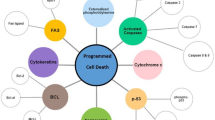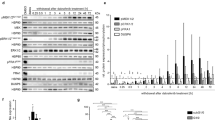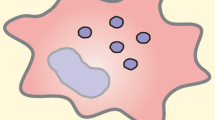Abstract
APO2 ligand (APO2L) is a CD95 ligand (CD95L)-related cytokine of the tumor necrosis factor family that interacts with agonistic (DR4, DR5) and antagonistic (DcR1, DcR2) receptors. Cultured malignant glioma cells preferentially express agonistic receptors and are susceptible to APO2L-induced apoptosis. Here, we report that 8 of 8 human glioma cell lines expressed APO2L mRNA and protein in vitro. Immunohistochemistry using a monoclonal antibody to APO2L revealed that all 23 primary astrocytic brain tumors analyzed, including low-grade astrocytomas and glioblastomas, express APO2L in vivo. With the exception of reactive astrocytes, non-neoplastic glia and neurons in the cerebrum lacked immunoreactivity of APO2L. Thus, in addition to the CD95/CD95L system, a second death ligand/death receptor pair may regulate susceptibility to apoptosis in human glial neoplasms.
Similar content being viewed by others
Author information
Authors and Affiliations
Additional information
Received: 19 August 1998 / Accepted: 14 September 1998
Rights and permissions
About this article
Cite this article
Rieger, J., Ohgaki, H., Kleihues, P. et al. Human astrocytic brain tumors express APO2L/TRAIL. Acta Neuropathol 97, 1–4 (1999). https://doi.org/10.1007/s004010050948
Issue Date:
DOI: https://doi.org/10.1007/s004010050948




